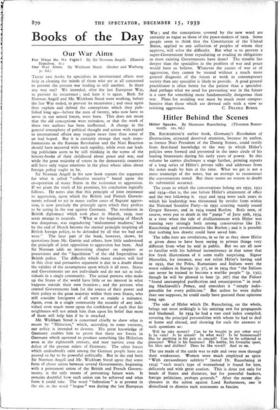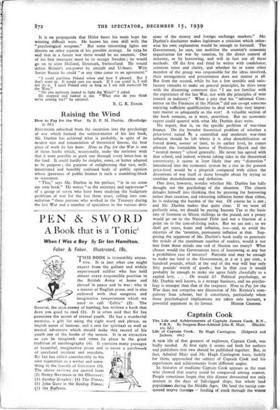Hitler Behind the Scenes
DR. RAUSCHNING'S earlier book, Germany's Revolution of Destruction, attracted deserved attention, because its author, as former Nazi President of the Danzig Senate, could testify
from first-hand knowledge to the way in which Hitler's policies were formed and presented in the inner circle of his leading lieutenants during his early years of power. In this volume he carries disclosure a stage further, printing reports of a long series of Hitler's private talks and addresses from the notes made by him at the time. What we get is not a mere transcript of the notes, but an attempt to reconstruct the conversations noted. But there seems no reason to doubt its substantial accuracy.
The years to which the conversations belong are 1932, 1933
and 1934—that is, the one before Hitler's attainment of office and the two following it. 1932 and 1934 were each years in which his leadership was threatened by revolts from within the National Socialist Party—in 1932 centring mainly round
Gregor Strasser, and in 1934 round Roehm. Both men, of course, were put to death in the " purge " of June 3oth, 1934, at a time when the tide of disillusionment with Hitler was
running very strongly both among conservatives like Dr. Rauschning and revolutionaries like Roehm ; and it is possible that nothing less drastic could have saved him.
The talks here are revelations, in so far as they show Hitler at given dates to have been saying in private things very different from what he said in public. But we are all now so familiar with his habitual inconsistency in that sense that
few fresh illustrations of it seem really surprising. Signor Mussolini, for instance, may not relish Hitler's having said in 1932, that the Poles, Rumanians and Italians were the worst soldiers in Europe (p. 37), or in 1934 that " the Italians can never be trained to become a warlike people " (p., 130);
though he will be pleased to hear (p. 267) that the Fiihrer " found unexampled purification and emancipation " in read- ing Machiavelli's Prince, and considers it " simply indis- pensable for every politician." But unless he were duller than one supposes, he could easily have guessed these opinions long ago.
The side of Hitler which Dr. Rauschning, on the whole, brings out most strikingly is his untiring zest for propaganda and blackmail. In 1934 he had a vast card index compiled, covering the principal personalities with whom he had to deal at home and abroad, and showing for each the answers to such questions as:
Will he take money? Can he be bought in any other way? Is he vain? Is he sexual? In what way? Is he homosexual? Has he anything in his past to conceal? Can he be subjected to pressure? What is his business? His hobby, his favourite sport, his likes and dislikes? Does he like travel? And so on.
The use made of the cards was to rule and sway men through their weaknesses. Women were much employed as spies. " With extraordinary subtlety " (noted Dr. Rauschning in 1934) " each man's type of womanhood is found for him, delicately and with great caution. This is done not only for
heads of States and dictators, but for powerful bankers, foreign politicians, perhaps generals." After the recent dis- closures in the action against Lord Rothermere, one 'is disinclined to dismiss such statements as fancies. It is on propaganda that Hitler bases his main hope for winning difficult wars. He knows his own skill with the " psychological weapons." But some interesting lights are thrown on other aspects of his possible strategy. In 1934 he said that in a future war there would be no neutrals. One of his first measures must be to occupy Sweden ; he would go on to seize Holland, Denmark, Switzerland. He would defeat Britain's sea-power by aircraft and U-boats. With Soviet Russia he could " at any time come to an agreement."
" I could partition Poland when and how I pleased. But I don't want to. It would cost too much. If I can avoid it, I will not do it. I need Poland only so long as I am still menaced by the West."
" Do you seriously intend to fight the West?" I asked. He stopped and looked at me. " What else do you think we're arming for?" he retorted.
R. C. K. ENSOR.









































 Previous page
Previous page